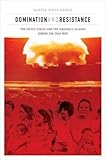Domination and Resistance : The United States and the Marshall Islands during the Cold War / Martha Smith-Norris.
Material type: TextPublisher: Honolulu : University of Hawaii Press, [2016]Copyright date: ©2016Description: 1 online resource (344 p.) : 31 b&w illustrationsContent type:
TextPublisher: Honolulu : University of Hawaii Press, [2016]Copyright date: ©2016Description: 1 online resource (344 p.) : 31 b&w illustrationsContent type: - 9780824847623
- 9780824858148
- 623.4/51190287 23
- DU710 .S55 2016eb
- online - DeGruyter
- Issued also in print.
| Item type | Current library | Call number | URL | Status | Notes | Barcode | |
|---|---|---|---|---|---|---|---|
 eBook
eBook
|
Biblioteca "Angelicum" Pont. Univ. S.Tommaso d'Aquino Nuvola online | online - DeGruyter (Browse shelf(Opens below)) | Online access | Not for loan (Accesso limitato) | Accesso per gli utenti autorizzati / Access for authorized users | (dgr)9780824858148 |
Browsing Biblioteca "Angelicum" Pont. Univ. S.Tommaso d'Aquino shelves, Shelving location: Nuvola online Close shelf browser (Hides shelf browser)

|

|

|

|

|

|

|
||
| online - DeGruyter Freedom without Justice : The Prison Memoirs of Chol Soo Lee / | online - DeGruyter Long Strange Journey : On Modern Zen, Zen Art, and Other Predicaments / | online - DeGruyter The Uprooted : Race, Children, and Imperialism in French Indochina, 1890-1980 / | online - DeGruyter Domination and Resistance : The United States and the Marshall Islands during the Cold War / | online - DeGruyter Divided Lenses : Screen Memories of War in East Asia / | online - DeGruyter Hearing the Future : The Music and Magic of the Sanguma Band / | online - DeGruyter Places for Happiness : Community, Self, and Performance in the Philippines / |
Frontmatter -- Contents -- Acknowledgments -- Introduction: Historical Context, Themes, Approach, and Research -- Chapter One. American Cold War Policies and the Enewetakese: Community Displacement, Environmental Degradation, and Indigenous Resistance -- Chapter Two. US Nuclear Experiments and the Bikinians: The "Nuclear Nomads" Revisited -- Chapter Three. US Nuclear Tests, the Environment, and Medical Research: Case Studies of the Rongelapese and Utirikese -- Chapter Four. US Missile Testing and the Creation of a Pacific Slum: The Kwajalein Missile Range and the Island of Ebeye -- Chapter Five. Negotiating a Cold War Treaty: The United States, the Marshall Islands, and the Compact of Free Association -- Epilogue: Legacies of US Cold War Policies and the Ongoing Quest for Justice in the Marshall Islands -- Notes -- Bibliography -- Index
restricted access online access with authorization star
http://purl.org/coar/access_right/c_16ec
Domination and Resistance illuminates the twin themes of superpower domination and indigenous resistance in the central Pacific during the Cold War, with a compelling historical examination of the relationship between the United States and the Republic of the Marshall Islands. For decision makers in Washington, the Marshall Islands represented a strategic prize seized from Japan near the end of World War II. In the postwar period, under the auspices of a United Nations Trusteeship Agreement, the United States reinforced its control of the Marshall Islands and kept the Soviet Union and other Cold War rivals out of this Pacific region. The United States also used the opportunity to test a vast array of powerful nuclear bombs and missiles in the Marshalls, even as it conducted research on the effects of human exposure to radioactive fallout.Although these military tests and human experiments reinforced the US strategy of deterrence, they also led to the displacement of several atoll communities, serious health implications for the Marshallese, and widespread ecological degradation. Confronted with these troubling conditions, the Marshall Islanders utilized a variety of political and legal tactics-petitions, lawsuits, demonstrations, and negotiations-to draw American and global attention to their plight. In response to these indigenous acts of resistance, the United States strengthened its strategic interests in the Marshalls but made some concessions to the islanders. Under the Compact of Free Association (COFA) and related agreements, the Americans tightened control over the Kwajalein Missile Range while granting the Marshallese greater political autonomy, additional financial assistance, and a mechanism to settle nuclear claims.Martha Smith-Norris argues that despite COFA's implementation in 1986 and Washington's pivot toward the Asia-Pacific region in the post-Cold War era, the United States has yet to provide adequate compensation to the Republic of the Marshall Islands for the extensive health and environmental damages caused by the US testing programs.
Issued also in print.
Mode of access: Internet via World Wide Web.
In English.
Description based on online resource; title from PDF title page (publisher's Web site, viewed 29. Jul 2021)


